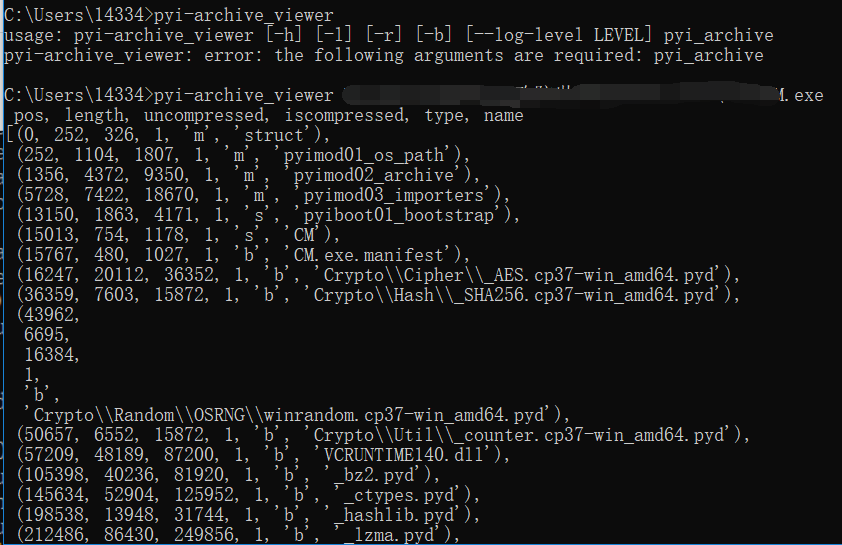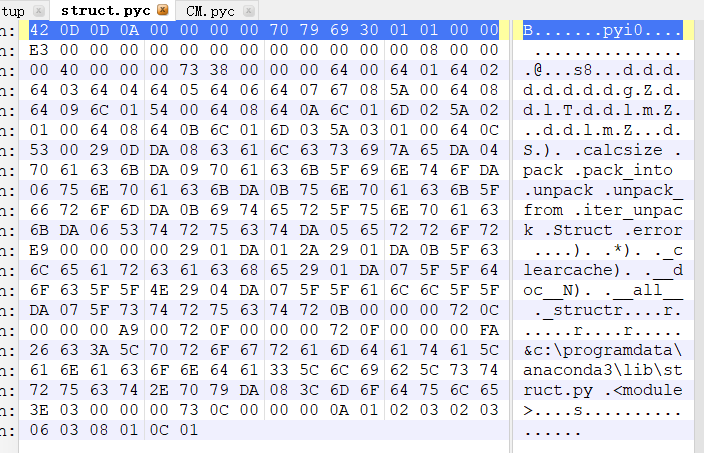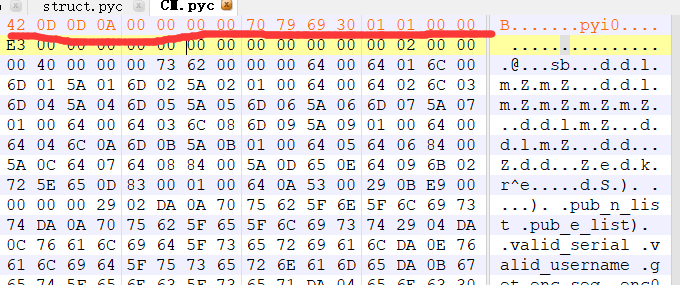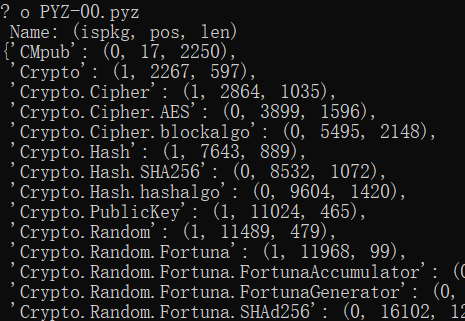参考链接:https://laucyun.com/33359ed9f725529ac9b606d054c8459d.html
way1:pyi-archive_viewer 提取pyc,uncompyle6反编译pyc得到py
way2:python-exe-unpacker https://github.com/countercept/python-exe-unpacker
way3:PyInstaller Extractor https://sourceforge.net/projects/pyinstallerextractor/
PyInstaller Extractor (修改添加3.7支持)

1 """ 2 PyInstaller Extractor v1.9 (Supports pyinstaller 3.3, 3.2, 3.1, 3.0, 2.1, 2.0) 3 Author : Extreme Coders 4 E-mail : extremecoders(at)hotmail(dot)com 5 Web : https://0xec.blogspot.com 6 Date : 29-November-2017 7 Url : https://sourceforge.net/projects/pyinstallerextractor/ 8 9 For any suggestions, leave a comment on 10 https://forum.tuts4you.com/topic/34455-pyinstaller-extractor/ 11 12 This script extracts a pyinstaller generated executable file. 13 Pyinstaller installation is not needed. The script has it all. 14 15 For best results, it is recommended to run this script in the 16 same version of python as was used to create the executable. 17 This is just to prevent unmarshalling errors(if any) while 18 extracting the PYZ archive. 19 20 Usage : Just copy this script to the directory where your exe resides 21 and run the script with the exe file name as a parameter 22 23 C:path oexe>python pyinstxtractor.py <filename> 24 $ /path/to/exe/python pyinstxtractor.py <filename> 25 26 Licensed under GNU General Public License (GPL) v3. 27 You are free to modify this source. 28 29 CHANGELOG 30 ================================================ 31 32 Version 1.1 (Jan 28, 2014) 33 ------------------------------------------------- 34 - First Release 35 - Supports only pyinstaller 2.0 36 37 Version 1.2 (Sept 12, 2015) 38 ------------------------------------------------- 39 - Added support for pyinstaller 2.1 and 3.0 dev 40 - Cleaned up code 41 - Script is now more verbose 42 - Executable extracted within a dedicated sub-directory 43 44 (Support for pyinstaller 3.0 dev is experimental) 45 46 Version 1.3 (Dec 12, 2015) 47 ------------------------------------------------- 48 - Added support for pyinstaller 3.0 final 49 - Script is compatible with both python 2.x & 3.x (Thanks to Moritz Kroll @ Avira Operations GmbH & Co. KG) 50 51 Version 1.4 (Jan 19, 2016) 52 ------------------------------------------------- 53 - Fixed a bug when writing pyc files >= version 3.3 (Thanks to Daniello Alto: https://github.com/Djamana) 54 55 Version 1.5 (March 1, 2016) 56 ------------------------------------------------- 57 - Added support for pyinstaller 3.1 (Thanks to Berwyn Hoyt for reporting) 58 59 Version 1.6 (Sept 5, 2016) 60 ------------------------------------------------- 61 - Added support for pyinstaller 3.2 62 - Extractor will use a random name while extracting unnamed files. 63 - For encrypted pyz archives it will dump the contents as is. Previously, the tool would fail. 64 65 Version 1.7 (March 13, 2017) 66 ------------------------------------------------- 67 - Made the script compatible with python 2.6 (Thanks to Ross for reporting) 68 69 Version 1.8 (April 28, 2017) 70 ------------------------------------------------- 71 - Support for sub-directories in .pyz files (Thanks to Moritz Kroll @ Avira Operations GmbH & Co. KG) 72 73 Version 1.9 (November 29, 2017) 74 ------------------------------------------------- 75 - Added support for pyinstaller 3.3 76 - Display the scripts which are run at entry (Thanks to Michael Gillespie @ malwarehunterteam for the feature request) 77 78 """ 79 80 from __future__ import print_function 81 import os 82 import struct 83 import marshal 84 import zlib 85 import sys 86 import imp 87 import types 88 from uuid import uuid4 as uniquename 89 90 91 class CTOCEntry: 92 def __init__(self, position, cmprsdDataSize, uncmprsdDataSize, cmprsFlag, typeCmprsData, name): 93 self.position = position 94 self.cmprsdDataSize = cmprsdDataSize 95 self.uncmprsdDataSize = uncmprsdDataSize 96 self.cmprsFlag = cmprsFlag 97 self.typeCmprsData = typeCmprsData 98 self.name = name 99 100 101 class PyInstArchive: 102 PYINST20_COOKIE_SIZE = 24 # For pyinstaller 2.0 103 PYINST21_COOKIE_SIZE = 24 + 64 # For pyinstaller 2.1+ 104 MAGIC = b'MEI�14�13�12�13�16' # Magic number which identifies pyinstaller 105 106 def __init__(self, path): 107 self.filePath = path 108 109 110 def open(self): 111 try: 112 self.fPtr = open(self.filePath, 'rb') 113 self.fileSize = os.stat(self.filePath).st_size 114 except: 115 print('[*] Error: Could not open {0}'.format(self.filePath)) 116 return False 117 return True 118 119 120 def close(self): 121 try: 122 self.fPtr.close() 123 except: 124 pass 125 126 127 def checkFile(self): 128 print('[*] Processing {0}'.format(self.filePath)) 129 # Check if it is a 2.0 archive 130 self.fPtr.seek(self.fileSize - self.PYINST20_COOKIE_SIZE, os.SEEK_SET) 131 magicFromFile = self.fPtr.read(len(self.MAGIC)) 132 133 if magicFromFile == self.MAGIC: 134 self.pyinstVer = 20 # pyinstaller 2.0 135 print('[*] Pyinstaller version: 2.0') 136 return True 137 138 # Check for pyinstaller 2.1+ before bailing out 139 self.fPtr.seek(self.fileSize - self.PYINST21_COOKIE_SIZE, os.SEEK_SET) 140 magicFromFile = self.fPtr.read(len(self.MAGIC)) 141 142 if magicFromFile == self.MAGIC: 143 print('[*] Pyinstaller version: 2.1+') 144 self.pyinstVer = 21 # pyinstaller 2.1+ 145 return True 146 147 print('[*] Error : Unsupported pyinstaller version or not a pyinstaller archive') 148 return False 149 150 151 def getCArchiveInfo(self): 152 try: 153 if self.pyinstVer == 20: 154 self.fPtr.seek(self.fileSize - self.PYINST20_COOKIE_SIZE, os.SEEK_SET) 155 156 # Read CArchive cookie 157 (magic, lengthofPackage, toc, tocLen, self.pyver) = 158 struct.unpack('!8siiii', self.fPtr.read(self.PYINST20_COOKIE_SIZE)) 159 160 elif self.pyinstVer == 21: 161 self.fPtr.seek(self.fileSize - self.PYINST21_COOKIE_SIZE, os.SEEK_SET) 162 163 # Read CArchive cookie 164 (magic, lengthofPackage, toc, tocLen, self.pyver, pylibname) = 165 struct.unpack('!8siiii64s', self.fPtr.read(self.PYINST21_COOKIE_SIZE)) 166 167 except: 168 print('[*] Error : The file is not a pyinstaller archive') 169 return False 170 171 print('[*] Python version: {0}'.format(self.pyver)) 172 173 # Overlay is the data appended at the end of the PE 174 self.overlaySize = lengthofPackage 175 self.overlayPos = self.fileSize - self.overlaySize 176 self.tableOfContentsPos = self.overlayPos + toc 177 self.tableOfContentsSize = tocLen 178 179 print('[*] Length of package: {0} bytes'.format(self.overlaySize)) 180 return True 181 182 183 def parseTOC(self): 184 # Go to the table of contents 185 self.fPtr.seek(self.tableOfContentsPos, os.SEEK_SET) 186 187 self.tocList = [] 188 parsedLen = 0 189 190 # Parse table of contents 191 while parsedLen < self.tableOfContentsSize: 192 (entrySize, ) = struct.unpack('!i', self.fPtr.read(4)) 193 nameLen = struct.calcsize('!iiiiBc') 194 195 (entryPos, cmprsdDataSize, uncmprsdDataSize, cmprsFlag, typeCmprsData, name) = 196 struct.unpack( 197 '!iiiBc{0}s'.format(entrySize - nameLen), 198 self.fPtr.read(entrySize - 4)) 199 200 name = name.decode('utf-8').rstrip('�') 201 if len(name) == 0: 202 name = str(uniquename()) 203 print('[!] Warning: Found an unamed file in CArchive. Using random name {0}'.format(name)) 204 205 self.tocList.append( 206 CTOCEntry( 207 self.overlayPos + entryPos, 208 cmprsdDataSize, 209 uncmprsdDataSize, 210 cmprsFlag, 211 typeCmprsData, 212 name 213 )) 214 215 parsedLen += entrySize 216 print('[*] Found {0} files in CArchive'.format(len(self.tocList))) 217 218 219 220 def extractFiles(self): 221 print('[*] Beginning extraction...please standby') 222 extractionDir = os.path.join(os.getcwd(), os.path.basename(self.filePath) + '_extracted') 223 224 if not os.path.exists(extractionDir): 225 os.mkdir(extractionDir) 226 227 os.chdir(extractionDir) 228 229 for entry in self.tocList: 230 basePath = os.path.dirname(entry.name) 231 if basePath != '': 232 # Check if path exists, create if not 233 if not os.path.exists(basePath): 234 os.makedirs(basePath) 235 236 self.fPtr.seek(entry.position, os.SEEK_SET) 237 data = self.fPtr.read(entry.cmprsdDataSize) 238 239 if entry.cmprsFlag == 1: 240 data = zlib.decompress(data) 241 # Malware may tamper with the uncompressed size 242 # Comment out the assertion in such a case 243 assert len(data) == entry.uncmprsdDataSize # Sanity Check 244 245 with open(entry.name, 'wb') as f: 246 f.write(data) 247 248 if entry.typeCmprsData == b's': 249 print('[+] Possible entry point: {0}'.format(entry.name)) 250 251 elif entry.typeCmprsData == b'z' or entry.typeCmprsData == b'Z': 252 self._extractPyz(entry.name) 253 254 255 def _extractPyz(self, name): 256 dirName = name + '_extracted' 257 # Create a directory for the contents of the pyz 258 if not os.path.exists(dirName): 259 os.mkdir(dirName) 260 261 with open(name, 'rb') as f: 262 pyzMagic = f.read(4) 263 assert pyzMagic == b'PYZ�' # Sanity Check 264 265 pycHeader = f.read(4) # Python magic value 266 267 if imp.get_magic() != pycHeader: 268 print('[!] Warning: The script is running in a different python version than the one used to build the executable') 269 print(' Run this script in Python{0} to prevent extraction errors(if any) during unmarshalling'.format(self.pyver)) 270 271 (tocPosition, ) = struct.unpack('!i', f.read(4)) 272 f.seek(tocPosition, os.SEEK_SET) 273 274 try: 275 toc = marshal.load(f) 276 except: 277 print('[!] Unmarshalling FAILED. Cannot extract {0}. Extracting remaining files.'.format(name)) 278 return 279 280 print('[*] Found {0} files in PYZ archive'.format(len(toc))) 281 282 # From pyinstaller 3.1+ toc is a list of tuples 283 if type(toc) == list: 284 toc = dict(toc) 285 286 for key in toc.keys(): 287 (ispkg, pos, length) = toc[key] 288 f.seek(pos, os.SEEK_SET) 289 290 fileName = key 291 try: 292 # for Python > 3.3 some keys are bytes object some are str object 293 fileName = key.decode('utf-8') 294 except: 295 pass 296 297 # Make sure destination directory exists, ensuring we keep inside dirName 298 destName = os.path.join(dirName, fileName.replace("..", "__")) 299 destDirName = os.path.dirname(destName) 300 if not os.path.exists(destDirName): 301 os.makedirs(destDirName) 302 303 try: 304 data = f.read(length) 305 data = zlib.decompress(data) 306 except: 307 print('[!] Error: Failed to decompress {0}, probably encrypted. Extracting as is.'.format(fileName)) 308 open(destName + '.pyc.encrypted', 'wb').write(data) 309 continue 310 311 with open(destName + '.pyc', 'wb') as pycFile: 312 pycFile.write(pycHeader) # Write pyc magic 313 pycFile.write(b'�' * 4) # Write timestamp 314 if self.pyver >= 33: 315 pycFile.write(b'�' * 4) # Size parameter added in Python 3.3 316 if self.pyver >= 37: 317 pycFile.write(b'�' * 4) # Size parameter added in Python 3.7 318 pycFile.write(data) 319 320 321 def main(): 322 if len(sys.argv) < 2: 323 print('[*] Usage: pyinstxtractor.py <filename>') 324 325 else: 326 arch = PyInstArchive(sys.argv[1]) 327 if arch.open(): 328 if arch.checkFile(): 329 if arch.getCArchiveInfo(): 330 arch.parseTOC() 331 arch.extractFiles() 332 arch.close() 333 print('[*] Successfully extracted pyinstaller archive: {0}'.format(sys.argv[1])) 334 print('') 335 print('You can now use a python decompiler on the pyc files within the extracted directory') 336 return 337 338 arch.close() 339 340 341 if __name__ == '__main__': 342 main()
推荐使用pyi-archive_viewer。而python-exe-unpacker 有时会报错,(两年前的工具了)
使用pyi-archive_viewer需要先安装PyInstaller(https://github.com/pyinstaller/pyinstaller)
- 安装PyInstaller模块,注意是:pip install PyInstaller

pyi-archive_viewer
相关命令:
U: go Up one level
O <name>: open embedded archive name
X <name>: extract name
Q: quit
- pyi-archive_viewer中使用x命令提取文件
pyinstaller打包会去掉pyc的magic和时间戳,需要手动添加数据
(可以先提取第一个文件,后面提取的文件对比添加数据)

对照添加数据

主模块的依赖包在PYZ-00.pyz,使用o命令打开

之后再使用x命令提取文件。
- 反编译pyc
pip install uncompyle6
uncompyle6 (https://github.com/rocky/python-uncompyle6)
Run
$ uncompyle6 *compiled-python-file-pyc-or-pyo*
For usage help:
$ uncompyle6 -h
当然也有很多pyc反编译在线工具可用
python pyinstxtractor.py xxx.exe

生成目录

